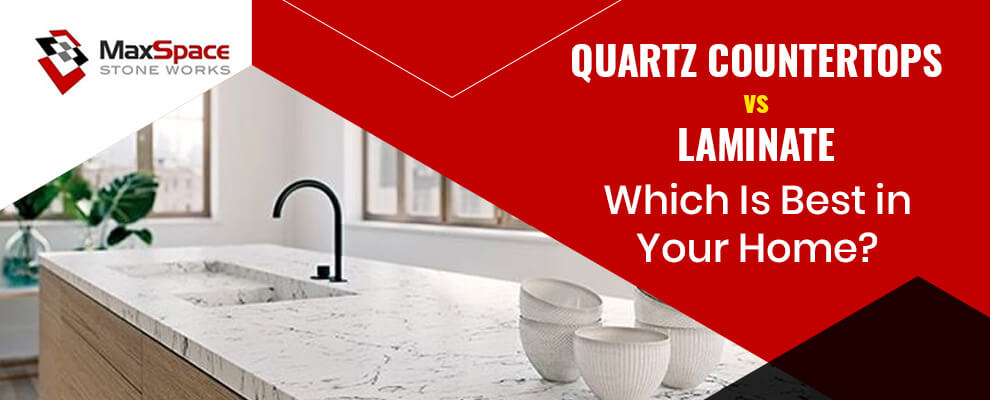Debates and decisions about decor can make renovating your kitchen overwhelming. That includes choosing a countertop to match your needs and style.
And there are many materials to choose from, including granite, stainless steel, quartz and laminate.
These last two are the most popular. And while both are attractive, durable, and add a certain luxury to your kitchen, there are stark differences. Some choose quartz for its easy maintenance and scratch-resistant properties; others prefer laminate for its cost-effectiveness and versatility.
Laminate vs. Quartz Kitchen Countertops – An Overview
Quartz and laminate are both popular (but very different) kitchen countertop materials.
So which is better?
Keep reading to find out.
-
Repair and Maintenance
Neither quartz nor laminate countertops require sealing or refinishing so both are easy to maintain. To keep clean, simply wipe them down with water and mild soap.

While laminate countertops are affordable and attractive, they’re prone to stains, so it’s important to wipe up stains immediately. They can also develop scratches and gouges with everyday usage, and, as they can’t be refinished, your only option is a replacement. Repairs are much easier with quartz countertops, owing to the uniformity of their patterning. While quartz chipping or breaking is highly unlikely, replacing a broken piece is quick and simple.
-
Durability
Unlike laminate, quartz countertops are almost indestructible. This is because of their unique composition – about 90% quartz and 10% binding polymers and coloured pigments – with the high quartz content making the countertop incredibly hard and durable. This makes quartz a popular choice for kitchen countertops, where spills, scratches and stains are common. You’ll be able to use your quartz countertops for years without having to worry about chips, scratches or cracks.
Laminate countertops, by contrast, are made primarily of layers of kraft paper and synthetic resins. They contain a thick slab of particleboard, which is hardly visible because it’s covered with a thin sheet of laminate. Though fairly resistant to stains and heat, laminate will stain if spills aren’t wiped up immediately or develop burn marks if hot pans are left unattended. Dents can also be a problem. Quartz’s high durability makes it an easy choice for busy kitchens.

-
Appearance
Both laminate and quartz mimic a range of materials. If you want to give your countertop a natural stone finish, quartz is the better option. High-end laminates can mimic natural stone like marble and granite, but they’ll never be able to do it as perfectly as quartz. This is because quartz has a visual depth that laminate doesn’t.
However, when it comes to colours, laminate comes in a far broader range of solid shades, from pastels and soft whites to vibrant oranges and rich greys and blacks. Quartz has a rather limited range of solid colours and a wider range of flecked ones.

-
Cost
As with anything, high quality comes at a high cost, and the price difference between laminate and quartz countertops is pretty significant. In fact, they’re often more than double the price of laminate ones. While laminate is a great option for homeowners on a budget, spending a little more on quartz is worth the price. You can rest assured knowing your countertop will look new for many years to come – and with a minimum of care and maintenance. The initial cost may be higher than any other tabletop material, but the long-term benefits are worth it.
For those who want a contemporary kitchen countertop with low maintenance and high durability, quartz is definitely the best choice. However, if you want something more affordable and DIY-friendly, laminate may be the better option. Your choice depends on your needs and budget.

